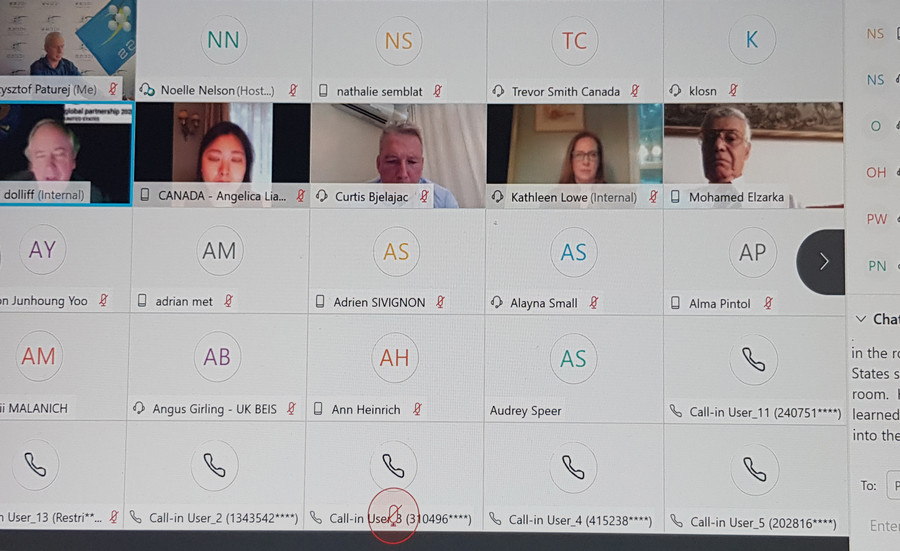The Meeting approved the G7 GP communication strategy proposed by Canada, which includes the issuing regular newsletter and GP Twitter account. The partners also agreed to enhance use of GP website. The partners agreed to strengthen the participation of private sector and civil society in the G7 GP work, as proposed by ICCSS, including engagement of donors from outside GP community. The partners endorsed the G7 Foreign Ministers' Statement on the Poisoning of Alexei Navalny. ICCSS highlighted the priority of chemical safety and security, as a leading security threat. ICCSS confirmed an active participation to promote G7 GP objectives to reduce CBRN threats worldwide.
The third on-line Plenary Meeting of G7 Global Partnership (G7 GP) on 9th September, 2020, chaired by Phil Dolliff, US Deputy Assistant State Secretary, attended by over 100 participants. ICCSS was represented by members of ICCSS Global Team: Prof. Syeda Sultana Razia from Bangladesh, Prof. Mohamed Elzarka from Egypt, Mr. Joseph Asahina from Japan, and Prof. Stefano Costanzi from US, and Amb. Krzysztof Paturej.
During the meeting Amb. K.Paturej expressed gratitude for Canada for leadership in the development and conduct of G7 GP Communication Strategy, financial support and coordination of match-making process, which brings together donors and recipients to consider funding for CBR related projects. He thanked Mr. Trevor Smith from Canada for his continued participation and guidance in international projects to reduce CBRN threats around the world.
ICCSS reported on active participation in the Chemical Security Working Group (CSWG), including in a series of match-making sessions. In partnership with Jordan (Jordan Armed Forces, Aqaba Special Economic Zone and Jordan University of Science and Technology) ICCSS presented and promoted within CSWG the projects in the Middle East program on chemical safety and security (LINK Jordan project).
Amb. Krzysztof Paturej thanked Mr. David Wulf, Co-Chair of the CSWG, Director for Chemical Security at DHS Cybersecurity and Infrastructure Security Agency, for effective command and leadership to enhance chemical security worldwide.
ICCSS briefed the G7 GP Plenary on the ongoing process of consultations with donors to finance the first projects within the ICCSS/Jordan led program chemical safety and security in the Middle East and development of Jordan as regional hub for chemical safety and security. Prof. Elzarka stressed the importance of chemical safety and security in the Middle East and confirmed his active role to enhance the program in Egypt and in the region.
Amb. Krzysztof Paturej informed the partners on the ongoing ICCSS survey on impact of COVID-19 on chemical security in the chemical and energy sectors. The survey noted the decreasing safety and security due to multiple reasons. They include disruptions in supply chain, diminishing regulatory and administrative controls and monitoring, Staff reductions, increasing cybersecurity threats. ICCCSS propose to conduct G7 GP survey on impact of COVID-19 on CBRN related facilities and activities with guidelines to enhance security at relevant plants. ICCSS also informed about the initiative to conduct a series of webinars on chemical safety and security and cybersecurity, with emphasis on airports and seaports. The ICCSS jointly with Metegrity, Canadian based company, continue cooperation to develop digital risk management models for CBRN threats.
International partners are invited to join the ICCSS in the development of COVID-19 safety security manual for conduct of live CBRN trainings and exercises. The manual guidelines will be applied for the first time during the Full Scale Field Exercise (FX), a final activity of EU-CHEM-REACT 2, EU funded project, moved to late April 2021. The COVID-19 safety security manual will serve as a guidebook for trainings and exercises for First Responders in CBRN conducted in conditions of chem-bio threats and pandemics.
Relevant information:
ICCSS inG7 Global Partnership – ICCSS is a member of the G7 Global Partnership (G7 GP) Working Group against the spread of materials and weapons of mass destruction and actively participates in the Chemical Security Working Group (CSWG), Biosecurity Working Group (BSWG) and CBRN Working Group. ICCSS leads within the G7 GP regional chemical safety and security. ICCSS jointly with Jordan seek G7 GP support for the program on chemical safety and security in Jordan and the Middle East. ICCSS proposals to enhance resilience against cyber threats and reliability in chemical and petrochemical industries will be discussed further in the G7 GP Working Groups.
The Global Partnership Against the Spread of Weapons and Materials of Mass Destruction(G7 Global Partnership) is a G7-led, 31-member international initiative aimed at preventing the proliferation of chemical, biological, radiological, and nuclear (CBRN) weapons and related materials. The Global Partnership serves as an international forum for coordination and delivery of programming to prevent CBRN terrorism and proliferation, follows a set of Principles and Guidelines that were established at the Kananaskis Summit (2002). G7 GP is chaired by GP Presidency. The Global Partnership relies on all member nations and partner organizations to bring their ideas and resources to the table. It also welcomes suggestions and proposals for collaborative threat reduction programming from external implementing partners (e.g. NGOs). Canada leads the G7 GP matchmaking.
Going Regional on Chem-Bio Safety and Security. Each region poses different security challenges as well as opportunities. Different regions have their own cultural distinctiveness, and this is true even within regions. Many regions do not have the capacity to take on many of the existing chem-bio safety and security risks and challenges. Because of growing chemical and bio security risks, ICCSS has identified and developed concrete programs for the regions of Eastern Europe and the Middle East, as priorities. Within ICCSS implemented EU-CHEM-REACT program, financed by EU, Belarus, Ukraine and Moldova are engaged in the development of modern civil protection and chemical and bio threat reduction. Within the ICCSS led Jordan program on chemical safety and security, financed by US DTRA, Jordan developed a model chemical security national regulatory framework. The project development offers Jordan as regional hub for chemical safety and security. This program will also cover bio-security concerns.
Digitizing Industry to Enhance Chem-Bio Security And Cybersecurity in time of COVID-19 pandemic
Each day we hear news about hackers hijacking bank accounts, loss of huge of data, attacks on critical infrastructure, what reminds of the importance of cybersecurity for Industrial Control Systems (ICS). ICCSS promotes cyber security as a core element of the broadly, holistically understood "security and protection" of the enterprise. This allows to integrate cybersecurity with safety security and reliability. We move from paper safety and security to digital/computerized security, which enable to monitor the industry process in real time. Use of new technologies of digitizing industrial plants, combined with existing techniques, such as Asset Integrity Management (AIM), assist to overcome the cyber-threats associated with the digital industry. Automating policies, procedures and reporting within integrated management platforms, will lead to better coordination, consistency, transparency, and reduce costs.

